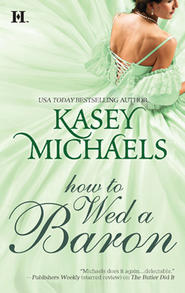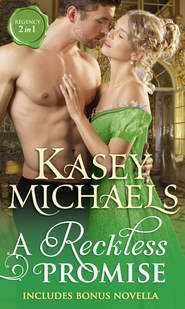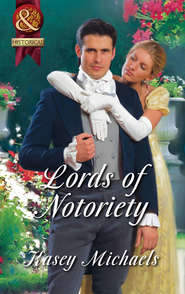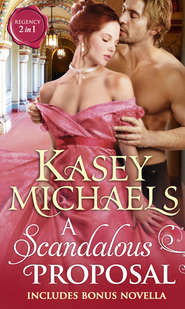По всем вопросам обращайтесь на: info@litportal.ru
(©) 2003-2024.
✖
The Chaotic Miss Crispino
Автор
Год написания книги
2018
Настройки чтения
Размер шрифта
Высота строк
Поля
“Is that right? And ’tis that what you call it now, me fine Marchioness? We lived higher than O’Hara’s hog on that ‘stage-playing,’ if memory serves,” Maximilien retorted, his round face turning a violent red, although Allegra, watching him, was very sure he was not really angry, but was only indulging in a little more stage-acting of his own. They were an unusual group, she acknowledged silently, but there was a lot of love in this villa, and she felt a momentary pang at the remembered loss of her own family.
“High as O’Hara’s hog, is it? And twice as much time was spent lower than O’Malley’s well, Uncail. I remember that as well,” Lady Coniston shot back, not without humor. “Now, do we waste time splitting hairs, or do we help Valerian and Signorina Crispino with their little problem? Uncle Max, your Conte di Casals may get the passport, but I don’t wish to hear how. I’m a mother now—and, like my husband, ‘past such things.’”
“It’s turning into an Irish shrew ye are, darlin’,” Max groused before downing a glass of wine.
“Valerian,” she went on, unheeding, still holding Allegra’s hand as she turned to her other guest, “all we heard when Tony and I last saw you in Rome was that you were off to find Lord Dugdale’s long-lost granddaughter and transport her to Brighton. I see the granddaughter before me, and I congratulate you on your success, but I sense that more is involved in this story. Please, if I promise to have the servants lay out some refreshments in the sala da pranzo, you must tell us everything, from the very beginning!”
Allegra’s ears pricked up at the mention of food, her recent seasickness forgotten, and she squeezed Lady Coniston’s hands appreciatively. “I will tell you everything, dear Marchesa, I promise, all about my singing, my life, and even the terrible Timoteos—directly after we have eaten!”
A FULL TWO WEEKS passed in relative bliss for Allegra, for in the Marchioness of Coniston she had found her first true female friend since childhood. Lady Coniston, or Candie, as she had begged Allegra to address her, was more than gracious, more than interested—she was a true sister of the heart.
For Candie had not always led a life of comfort; she had known poverty, she had known fear, and she had learned to make her own way, by whatever means she could. But, like Allegra, she had never sacrificed her honor in order to fill her belly.
Candie had been rewarded for her purity with the love of Tony Betancourt, a man Allegra found to be immensely wonderful, and with the birth of their son, Murphy, an adorable blond cherub of two years who held his uncle Max’s heart in his chubby little hands.
Could there be such a similarly rosy future in Brighton for someone like Allegra? Somehow, she doubted it, no matter how enthusiastic Candie was about her prospects.
To that end, and over Allegra’s protests, Candie had set out to provide her young guest with a complete new wardrobe the very morning after Valerian and Allegra’s arrival in Naples. Although Italian styles were still woefully behind those of Paris, there existed enough modistes sufficiently schooled in the art of copying for Allegra to acquire a fairly extensive wardrobe that would be considered not only acceptable but wonderfully stylish by the ladies of Brighton.
But the Marchioness was not content to merely dress her young guest in fine feathers. Oh, no. She spent long hours schooling Allegra in proper deportment (including at least one stern lecture concerning Allegra’s tendency to gesture with her hands as she spoke, an entirely too Italian habit), and had helped her to weed most Italian words and phrasing from her vocabulary, permitting her to use only those considered suitably Continental and sure to impress her English relatives.
“I was the Conte di Casals’s niece Gina more than once in the past, you understand,” the Marchioness had informed her as the two sat alone late one night over Allegra’s lessons, “so I have a fairly good notion as to how you should go on. Have I told you about the time—I was just a young girl, I believe—that Uncle Max wrangled us an audience with the Pope?”
“His Holiness!” Allegra had exclaimed, much impressed. “I once sang a solo for the Bishop of Bologna, but it is not the same, is it?”
Yes, there were many lessons, but there were just as many stories, and just as many shared reminiscences between the new friends, quite a few of them having to do with the at-times-almost-bizarre courtship of Candice Murphy by Mark Antony Betancourt, Seventh Marquess of Coniston. The Marquess, it seemed, had until his marriage been known all over London as Mister Overnite: a carefree, heartbreakingly handsome man who supposedly had held the modern-day British record for dallying the whole night long in more society matrons’ beds than half the husbands in the Upper Ten Thousand.
It hadn’t been easy for Tony to understand that his bachelor days were effectively over from the first moment he’d clapped eyes on the mischievous Miss Murphy, but—as Candie, blushing, told Allegra—he had lived to give proof to the adage that reformed rakes make the very best of husbands.
As for Allegra’s singing career, it had been left to Valerian to explain to her that this, alas, was over, finally and completely. It was not to be mentioned in company, it was not to be considered as a viable part of her future—it simply was not to be thought of, ever again!
Only the quick-witted Tony had been able to save Valerian from Allegra’s employment of a particularly vile Italian curse, which he did by quickly pointing out that there was nothing wrong with Allegra considering herself a talented amateur.
“Why, as a matter of fact,” he had interjected cleverly, winking at his appreciative wife, “Prinny himself is quite a devotee of Italian opera. You’re bound to be the sensation of the age, Allegra, once you sing for him, for many of his guests perform at the Marine Pavilion after one of his Highness’s hours-long dinner parties.”
“Yes, the dinner parties,” Valerian had added, knowing by now where to aim his darts where Allegra was concerned. “I heard it said that there are often two dozen main dishes served in one evening,” he slid in, watching as Allegra’s sapphire eyes opened wide. “That’s not to mention the many side dishes, cakes, puddings, pastries, and the rest. Although I have not yet had the pleasure, Duggy is one of Old Swellfoot’s cronies, signorina, so you are sure to be invited, if you can just learn to behave yourself.”
All in all, Allegra had become not only resigned to leaving Italy but anxious to reach England and her mother’s birthplace, although it was with tears in her eyes that she waved good-bye to the Betancourts as the ship pulled away from the pier, her newly obtained passport safely in Valerian’s possession.
Then, suddenly, all her new finery to one side and her more refined English forgotten, she pointed to the dock, hopping on one slippered foot as she exclaimed, “Impossible! It is that terrible Bernardo—here, in Napoli! How has he found me? Again he shows up unwanted, come un cane nella chiesa— like a dog in a church!”
As Bernardo ran to the very edge of the pier, tears streaming down his handsome face and looking for all the world as if he was about to throw himself into the water in order to swim out to the ship, Allegra struck her right arm straight out in front of her, tucked her middle two fingers beneath her thumb, and shouted dramatically, “Si rompe il corno!”
Immediately Bernardo stepped back as if stunned, clutching his chest.
“You’re going to break his horns?” Valerian asked from beside her, watching bemusedly as her small but voluptuous figure was shown to advantage by her antics. “Why don’t I believe that is some sort of quaint Italian farewell?”
Allegra threw back her head, her long black hair blowing in the wind, since she had shunned Candie’s suggestion that she wear one of the new bonnets Valerian’s money had bought her. “I wished evil on him, signore. Great evil such as only another Italian can imagine!”
“Oh, you did, did you? And now you will kindly take it off again,” Valerian commanded, shaking his head. “Otherwise the lovesick fool will be on my conscience forevermore. You’re leaving Italy, signorina, so you can afford to be magnanimous. Bernardo Timoteo and his cohorts can no longer harm you.”
Allegra turned to Valerian, her face alight with glee. “Magnifico, signore! You are right! I, Allegra Crispino, will be magnanimous!” She leaned over the railing, waving a white handkerchief at the openly sobbing Bernardo. “Addio, caro Bernardo addio!” she called brightly, until the handsome young man on the pier heard her and began waving in return.
Valerian, well pleased with himself, smiled and waved to Bernardo as well, hardly believing he was actually on his way to Brighton at last, to achieve the long-awaited removal of the mercurial Allegra Crispino from his guardianship.
An odd, unrecognizable sensation in his stomach at the thought of depositing Allegra with Lord Dugdale and then walking away prompted him to turn his head and look down at the strange young girl.
“Allegra!” he was startled into saying, for she was gripping the rail with both hands, huge, crystalline tears running down her wind-reddened cheeks. “Why are you crying? Surely you’re not going to miss having the Timoteo dogs barking at your heels?”
“I shall never see my beloved Italia again, Valerian,” she answered in a small voice, her gaze still intent on the rapidly disappearing shoreline as she gave out with a shuddering sigh. “My madre, my papà they live in that earth. They are lost to me forever; all of what is home to me is now gone, while I sail away to an uncertain future with a grandfather I don’t know. I didn’t know how much it would hurt, Valerian, or how very much frightened I would feel.”
Before he could think, before he could weigh the right or the wrong of it, Valerian gathered Allegra’s small frame close against his chest, where she remained, her arms wrapped tightly around his waist, as, together, they watched the only homeland she had ever known fade from sight.
CHAPTER THREE
AGNES KITTREDGE sat in the outdated drawing room she would most happily have given her best Kashmir shawl to redecorate, awaiting the arrival of her children, seventeen-year-old Isobel and her older brother, Gideon, who had reached the age of three and twenty, Agnes was sure, thanks only to his fond mama’s most assiduous nursing of his delicate constitution.
Mrs. Kittredge’s brother, Baron Dennis Dugdale, was upstairs in his rooms, his gouty right foot swathed in bandages Agnes would much rather see bound tightly about his clearly disordered head.
She was furious, Agnes Kittredge was, pushed nearly to the brink of distraction by the disquieting thought that her beloved brother, Dennis, could have the nerve to recover his health after he had most solemnly promised that his demise was imminent. Was there no one, who could be trusted to keep his word anymore, not even a brother?
Not only had her aging sibling once more become the possessor of depressingly good health, but his general demeanor had reverted to one of such high good humor that Agnes, who had never been a tremendous advocate of levity, was lately finding herself hard-pressed to keep a civil tongue in her head whenever the jolly Baron was about.
Lord Dugdale’s near-constant, jocular remarks alluding to a “change in the wind,” and his oblique hints at a coming “surprise to knock your nose more sideways than it already is, Aggie,” were not only most depressingly annoying, they were beginning to worry her very much.
Everything had always been so settled, so regulated, in the life they all lived at Number 23 in the Royal Crescent Terrace. Agnes ruled, Isobel preened, Gideon gambled, and dearest Denny paid the bills. It was all so simple, so orderly. Now Lord Dugdale was making noises as if this arrangement no longer could be regarded as the ordinary, and that soon there would come a major readjustment in all their lives.
Agnes had agreed with this notion in part at first, when the Baron had spoken so earnestly of his imminent demise. There most assuredly would be changes at Number 23 when that unhappy day finally dawned.
Agnes would still rule, Isobel would still preen, Gideon would still gamble. But forever gone from the scene would be Lord Dugdale and his annoying habit of closely questioning the amount of the bills his family presented to him with every expectation that they be paid at once, and without his first issuing a sermon about the evils of incautious spending.
Once her brother, rest his soul, was safely underground, Agnes would be free to run the household exactly as she wished, without the wearying necessity to beg for every groat. This sort of “change” Agnes had looked forward to with great expectation, nearly unmixed with sorrow for the soon-to-be-departed brother, who, after all, had led a good long life and deserved his rest.
It was all that new doctor’s fault, Agnes had decided when her brother, far from sliding conveniently into his grave, began to make a near-miraculous recovery from a violent uproar of the bowels. Who ever heard of such a thing? No bleeding. No leeches. No thin gruel. Just plenty of fresh air, exercise, and good, hearty food. The treatment should have killed the Baron, but it hadn’t.
Agnes hadn’t allowed the doctor back in the house since the first day Lord Dugdale had sat up and loudly called for his pipe and a full bottle of his favorite cherry ripe.
“Not that it did me a penny worth of good,” she groused, arranging her shawl more firmly about her bony shoulders as she thought of her brother’s refusal to suffer an immediate relapse. “The man’s body has been restored at the cost of his wits. It had been nearly three months, and still we must hear daily about this surprise of his. It is time and more I consider placing the poor, sainted man in an institution where there are those trained in dealing with delusional lunatics such as Denny.”
“Talking to yourself, Mama? I must admit I do know of some who do so from time to time, but then I believe those people are usually rather deep in their cups. Have you been nipping while my back was turned, Mama? It isn’t like you; but then this entire household has been rather irregular for weeks on end now, hasn’t it?”
Agnes Kittredge looked up at the sound of her beloved Gideon’s voice. “Darling!” she exclaimed, patting the space beside her on the settee. “Come sit down and tell me how you feel this morning. You were abroad quite late last night, I believe. The damp night air isn’t good for you, you know. Have you breakfasted? I expressly ordered the eggs be poached this morning, as they are much more suited to your delicate constitution in that form than the hard-cooked variety you persist in eating whenever my back is turned.”
He sat down dutifully, spreading his coattails neatly as he did so. “I shunned eggs entirely this morning, Mama, in favor of dry toast dipped in watered wine, for I woke with the most shocking headache. Do you think it’s coming on to rain? It couldn’t have been the canary I partook of last night, for you know I never drink to excess.”
“Indeed no, Gideon. You would never do that, not with your fragile system.” Agnes turned to look adoringly upon her son. Gideon Kittredge was as handsome as his mother and sister were plain—although how this quirk of nature came about no one save Lord Dugdale, who once mentioned the idea of his sister having played her husband false at least the once, had ever been able to understand the phenomenon.
Gideon had been born scarcely five months after his parents’ marriage, a sickly babe whose small size and poor chances for survival lent at least partial credence to the outrageous fib that he had been born much too soon due to an unfortunate fright his mother had taken at the sight of a tumbling dwarf in the small traveling circus she and her husband had chanced upon the same day Agnes was delivered of her firstborn child.











